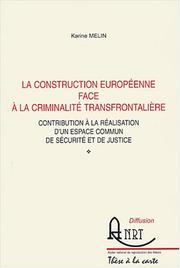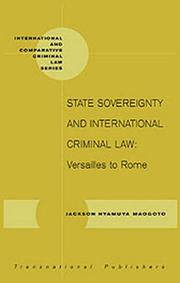| Listing 1 - 10 of 916 | << page >> |
Sort by
|
Book
ISBN: 9926820573 Year: 2019 Publisher: Soravejo : Udruženje za društvena istraživanja i komunikacije (UDIK),
Abstract | Keywords | Export | Availability | Bookmark
 Loading...
Loading...Choose an application
- Reference Manager
- EndNote
- RefWorks (Direct export to RefWorks)
This war crime occurred on March 26, 1992, when various formations mixed between Bosniaks and Croats, with the markings of Croatian military formations, crossed the Sava River from Croatia and committed a war crime against the Serb population in Sijekovac. The motive and cause of the attack on Sijekovac remains questionable to this day. Serbian sources claim that Croat-Bosniak forces killed civilians and set fire to around 50 houses in the village without any reason, while Human Rights Watch states that it could not establish allegations of massacre because it was an armed conflict between Serb and Croat-Bosniak soldiers, while which killed about 20 soldiers. Civilian casualties in that conflict occurred by accident, when the locals found themselves between two conflicting parties. In May 2014, the Court of Bosnia and Herzegovina sentenced Zemir Kovačević to ten years in prison. As a member of the Intervention Platoon of the 1st Bosanski Brod Brigade, during the months of March and April 1992, and July and August of the same year, he participated in murders, torture, illegal imprisonment, forced labor, alone and with unidentified members of the HOS and the Croatian Army (HV) in the area of the municipality of Bosanski Brod.
Book
ISBN: 9926820565 Year: 2019 Publisher: Saravejo : Udruženje za društvena istraživanja i komunikacije (UDIK),
Abstract | Keywords | Export | Availability | Bookmark
 Loading...
Loading...Choose an application
- Reference Manager
- EndNote
- RefWorks (Direct export to RefWorks)
The Grabovica massacre refers to the murders of 33 ethnic Croat inhabitants of the village of Grabovica located between Jablanica and Mostar by members of the Army of the Republic of Bosnia and Herzegovina. The massacre occurred during Operation Neretva '93, which aimed to conquer HVO-controlled areas from Bugojno to Mostar. The victims included 17 women and one child. The youngest victim was Mladenka Zadro, a four-year-old girl, and the oldest, 87-year-old Marko Marić. This publication includes three convictions for war crimes committed in the village of Grabovica, issued by the Cantonal Courts in Mostar and Sarajevo, and the Supreme Court of the Federation of Bosnia and Herzegovina. They were sentenced Enes Šakrak, Haris Rajkić, Mustafa Hota, Nihad Vlahovljak, and Sead Karagić from nine to thirteen years in prison.
Book
ISBN: 9926801196 Year: 2017 Publisher: Sarajevo : Udruženje za društvena istraživanja i komunikacije (UDIK),
Abstract | Keywords | Export | Availability | Bookmark
 Loading...
Loading...Choose an application
- Reference Manager
- EndNote
- RefWorks (Direct export to RefWorks)
This book contains verdicts passed before the Court of Bosnia and Herzegovina and the Cantonal Court in Sarajevo, which concern war crimes committed in the area of the pre-war municipality of Foča. The book contains the following subjects: Gojko Janković, Jasko Gazdić, Krsto Dostić, Mitar Rašević and Savo Todović; Neđo Samardžić, Novica Tripković, Radovan Stanković and Veselin Čančar. They were sentenced to four to 34 years in prison. Gojko Janković received the highest prison sentence. Some of the convicts are already free today. Mitar Rašević was released from the Foča Penitentiary in 2010, and Savo Todović in 2014. In addition to the verdicts, the book includes a list of names of persons who have been exhumed from mass graves and who disappeared in the area of the pre-war municipality of Foča.

ISBN: 1571050655 Year: 1997 Publisher: Irvington-on-Hudson (N.Y.) : Transnational publishers,
Abstract | Keywords | Export | Availability | Bookmark
 Loading...
Loading...Choose an application
- Reference Manager
- EndNote
- RefWorks (Direct export to RefWorks)

ISBN: 2284037704 Publisher: Lille : ANRT. Atelier national de reproduction des thèses,
Abstract | Keywords | Export | Availability | Bookmark
 Loading...
Loading...Choose an application
- Reference Manager
- EndNote
- RefWorks (Direct export to RefWorks)
Book
Year: 1977 Publisher: Washington : U.S. Govt. Print. Off.,
Abstract | Keywords | Export | Availability | Bookmark
 Loading...
Loading...Choose an application
- Reference Manager
- EndNote
- RefWorks (Direct export to RefWorks)
Book
Year: 1977 Publisher: Washington : U.S. Govt. Print. Off.,
Abstract | Keywords | Export | Availability | Bookmark
 Loading...
Loading...Choose an application
- Reference Manager
- EndNote
- RefWorks (Direct export to RefWorks)
Book
ISBN: 6000005776 661173368X 1281733687 9786611733681 160750300X 1433711338 9781607503002 1586038230 9781586038236 Year: 2008 Publisher: Amsterdam, Netherlands Washington, DC IOS Press
Abstract | Keywords | Export | Availability | Bookmark
 Loading...
Loading...Choose an application
- Reference Manager
- EndNote
- RefWorks (Direct export to RefWorks)
Terrorism is not the only threat that causes the emergence of crises. The so-called 'crisification' of our security environment also seems to be rising due to many other factors. Such an environment is generating many crises related to politico-military conflicts, natural disasters, infectious diseases, information disruptions, ethnic or religious violence and others. Many of these crises are completely or nearly completely unexpected and have a strong effect on the security of individual people, states and the international community. 'Crisis' has become the key word instead of 'war'. The awa
International crimes --- Terrorism --- Prevention
Book
ISBN: 9004642676 Year: 1995 Publisher: Dordrecht, The Netherlands : Kluwer Academic Publishers,
Abstract | Keywords | Export | Availability | Bookmark
 Loading...
Loading...Choose an application
- Reference Manager
- EndNote
- RefWorks (Direct export to RefWorks)

ISBN: 9789004479630 9781571052957 Year: 2003 Publisher: Leiden; Boston : Brill | Nijhoff
Abstract | Keywords | Export | Availability | Bookmark
 Loading...
Loading...Choose an application
- Reference Manager
- EndNote
- RefWorks (Direct export to RefWorks)
This innovative text is shows how there has been a concerted effort, since the end of World War I, to curb a state's power and freedom of action through the concept of international accountability to a set of recognized rules and norms. A state not only is to adhere to these rules but also can be sanctioned by an international penal process through enforcement of international criminal law. Adoption of the Rome Statute and the creation of the International Criminal Court are the culmination of many years of effort to challenge the power of state action. Scholars and students of international law with an interest in international criminal law will find this volume an interesting narrative of how the developments of international penal mechanisms of the 20th century have contributed to a diminution of state sovereignty. Published under the Transnational Publishers imprint.
International crimes --- Sovereignty --- History
| Listing 1 - 10 of 916 | << page >> |
Sort by
|

 Search
Search Feedback
Feedback About UniCat
About UniCat  Help
Help News
News